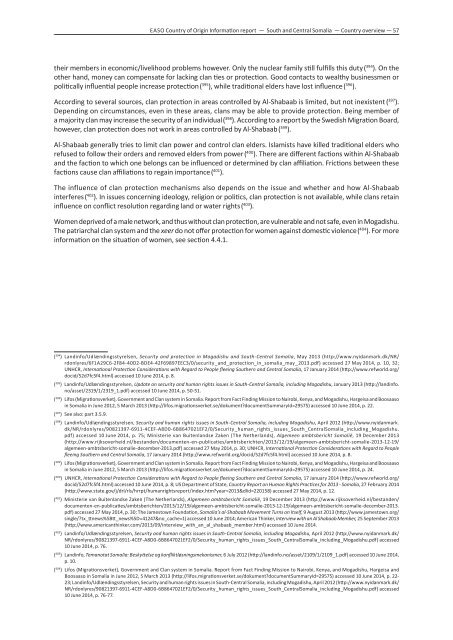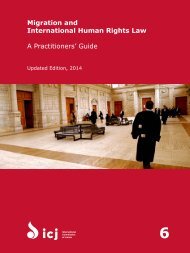Create successful ePaper yourself
Turn your PDF publications into a flip-book with our unique Google optimized e-Paper software.
EASO Country of Origin Information report — South and Central <strong>Somalia</strong> — Country overview — 57<br />
their members in economic/livelihood problems however. Only the nuclear family still fulfills this duty ( 394 ). On the<br />
other hand, money can compensate for lacking clan ties or protection. Good contacts to wealthy businessmen or<br />
politically influential people increase protection ( 395 ), while traditional elders have lost influence ( 396 ).<br />
According to several sources, clan protection in areas controlled by Al‐Shabaab is limited, but not inexistent ( 397 ).<br />
Depending on circumstances, even in these areas, clans may be able to provide protection. Being member of<br />
a majority clan may increase the security of an individual ( 398 ). According to a report by the Swedish Migration Board,<br />
however, clan protection does not work in areas controlled by Al‐Shabaab ( 399 ).<br />
Al‐Shabaab generally tries to limit clan power and control clan elders. Islamists have killed traditional elders who<br />
refused to follow their orders and removed elders from power ( 400 ). There are different factions within Al‐Shabaab<br />
and the faction to which one belongs can be influenced or determined by clan affiliation. Frictions between these<br />
factions cause clan affiliations to regain importance ( 401 ).<br />
The influence of clan protection mechanisms also depends on the issue and whether and how Al‐Shabaab<br />
interferes ( 402 ). In issues concerning ideology, religion or politics, clan protection is not available, while clans retain<br />
influence on conflict resolution regarding land or water rights ( 403 ).<br />
Women deprived of a male network, and thus without clan protection, are vulnerable and not safe, even in Mogadishu.<br />
The patriarchal clan system and the xeer do not offer protection for women against domestic violence ( 404 ). For more<br />
information on the situation of women, see section 4.4.1.<br />
( 394 ) Landinfo/Udlændingsstyrelsen, Security and protection in Mogadishu and South‐Central <strong>Somalia</strong>, May 2013 (http://www.nyidanmark.dk/NR/<br />
rdonlyres/6F1A29C6-2F84-40D2-BDE4-42F69897EEC3/0/security_and_protection_in_somalia_may_2013.pdf) accessed 27 May 2014, p. 10, 32;<br />
UNHCR, International Protection Considerations with Regard to People fleeing Southern and Central <strong>Somalia</strong>, 17 January 2014 (http://www.refworld.org/<br />
docid/52d7fc5f4.html) accessed 10 June 2014, p. 8.<br />
( 395 ) Landinfo/Udlændingsstyrelsen, Update on security and human rights issues in South‐Central <strong>Somalia</strong>, including Mogadishu, January 2013 (http://landinfo.<br />
no/asset/2319/1/2319_1.pdf) accessed 10 June 2014, p. 50-51.<br />
( 396 ) Lifos (Migrationsverket), Government and Clan system in <strong>Somalia</strong>. <strong>Report</strong> from Fact Finding Mission to Nairobi, Kenya, and Mogadishu, Hargeisa and Boosaaso<br />
in <strong>Somalia</strong> in June 2012, 5 March 2013 (http://lifos.migrationsverket.se/dokumentdocumentSummaryId=29575) accessed 10 June 2014, p. 22.<br />
( 397 ) See also: part 3.5.9.<br />
( 398 ) Landinfo/Udlændingsstyrelsen, Security and human rights issues in South‐Central <strong>Somalia</strong>, including Mogadishu, April 2012 (http://www.nyidanmark.<br />
dk/NR/rdonlyres/90821397-6911-4CEF‐A8D0-6B8647021EF2/0/Security_human_rights_issues_South_Central<strong>Somalia</strong>_including_Mogadishu.<br />
pdf) accessed 10 June 2014, p. 75; Ministerie van Buitenlandse Zaken (The Netherlands), Algemeen ambtsbericht Somalië, 19 December 2013<br />
(http://www.rijksoverheid.nl/bestanden/documenten‐en‐publicaties/ambtsberichten/2013/12/19/algemeen‐ambtsbericht‐somalie-2013-12-19/<br />
algemeen‐ambtsbericht‐somalie‐december-2013.pdf) accessed 27 May 2014, p. 30; UNHCR, International Protection Considerations with Regard to People<br />
fleeing Southern and Central <strong>Somalia</strong>, 17 January 2014 (http://www.refworld.org/docid/52d7fc5f4.html) accessed 10 June 2014, p. 8.<br />
( 399 ) Lifos (Migrationsverket), Government and Clan system in <strong>Somalia</strong>. <strong>Report</strong> from Fact Finding Mission to Nairobi, Kenya, and Mogadishu, Hargeisa and Boosaaso<br />
in <strong>Somalia</strong> in June 2012, 5 March 2013 (http://lifos.migrationsverket.se/dokumentdocumentSummaryId=29575) accessed 10 June 2014, p. 24.<br />
( 400 ) UNHCR, International Protection Considerations with Regard to People fleeing Southern and Central <strong>Somalia</strong>, 17 January 2014 (http://www.refworld.org/<br />
docid/52d7fc5f4.html) accessed 10 June 2014, p. 8; US Department of State, Country <strong>Report</strong> on Human Rights Practices for 2013 - <strong>Somalia</strong>, 27 February 2014<br />
(http://www.state.gov/j/drl/rls/hrrpt/humanrightsreport/index.htmyear=2013&dlid=220158) accessed 27 May 2014, p. 12.<br />
( 401 ) Ministerie van Buitenlandse Zaken (The Netherlands), Algemeen ambtsbericht Somalië, 19 December 2013 (http://www.rijksoverheid.nl/bestanden/<br />
documenten‐en‐publicaties/ambtsberichten/2013/12/19/algemeen‐ambtsbericht‐somalie-2013-12-19/algemeen‐ambtsbericht‐somalie‐december-2013.<br />
pdf) accessed 27 May 2014, p. 30; The Jamestown Foundation, <strong>Somalia</strong>’s al‐Shabaab Movement Turns on Itself, 9 August 2013 (http://www.jamestown.org/<br />
single/tx_ttnews%5Btt_news%5D=41247&no_cache=1) accessed 10 June 2014; American Thinker, Interview with an Al Shabaab Member, 25 September 2013<br />
(http://www.americanthinker.com/2013/09/interview_with_an_al_shabaab_member.html) accessed 10 June 2014.<br />
( 402 ) Landinfo/Udlændingsstyrelsen, Security and human rights issues in South‐Central <strong>Somalia</strong>, including Mogadishu, April 2012 (http://www.nyidanmark.dk/<br />
NR/rdonlyres/90821397-6911-4CEF‐A8D0-6B8647021EF2/0/Security_human_rights_issues_South_Central<strong>Somalia</strong>_including_Mogadishu.pdf) accessed<br />
10 June 2014, p. 76.<br />
( 403 ) Landinfo, Temanotat <strong>Somalia</strong>: Beskyttelse og konfliktløsningsmekanismer, 6 July 2012 (http://landinfo.no/asset/2109/1/2109_1.pdf) accessed 10 June 2014,<br />
p. 10.<br />
( 404 ) Lifos (Migrationsverket), Government and Clan system in <strong>Somalia</strong>. <strong>Report</strong> from Fact Finding Mission to Nairobi, Kenya, and Mogadishu, Hargeisa and<br />
Boosaaso in <strong>Somalia</strong> in June 2012, 5 March 2013 (http://lifos.migrationsverket.se/dokumentdocumentSummaryId=29575) accessed 10 June 2014, p. 22-<br />
23; Landinfo/Udlændingsstyrelsen, Security and human rights issues in South‐Central <strong>Somalia</strong>, including Mogadishu, April 2012 (http://www.nyidanmark.dk/<br />
NR/rdonlyres/90821397-6911-4CEF‐A8D0-6B8647021EF2/0/Security_human_rights_issues_South_Central<strong>Somalia</strong>_including_Mogadishu.pdf) accessed<br />
10 June 2014, p. 76-77.



